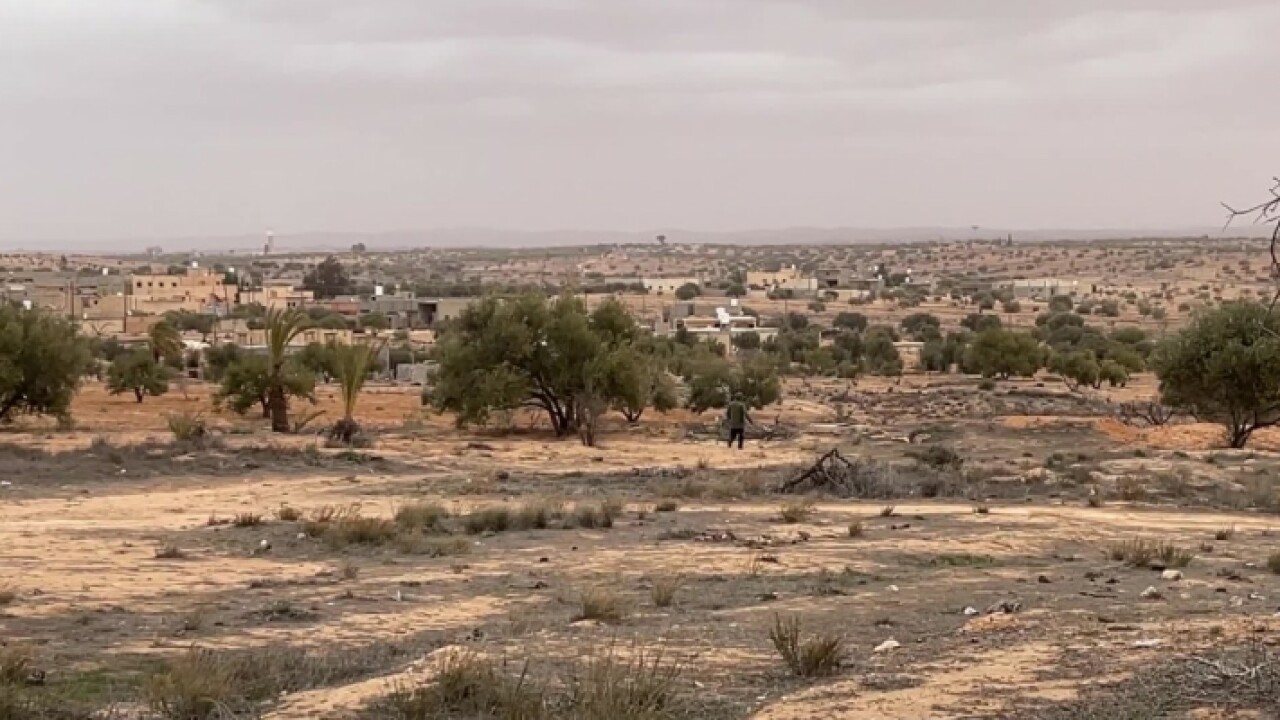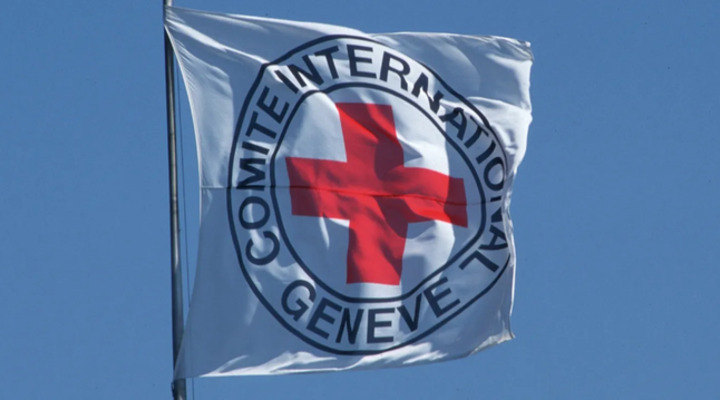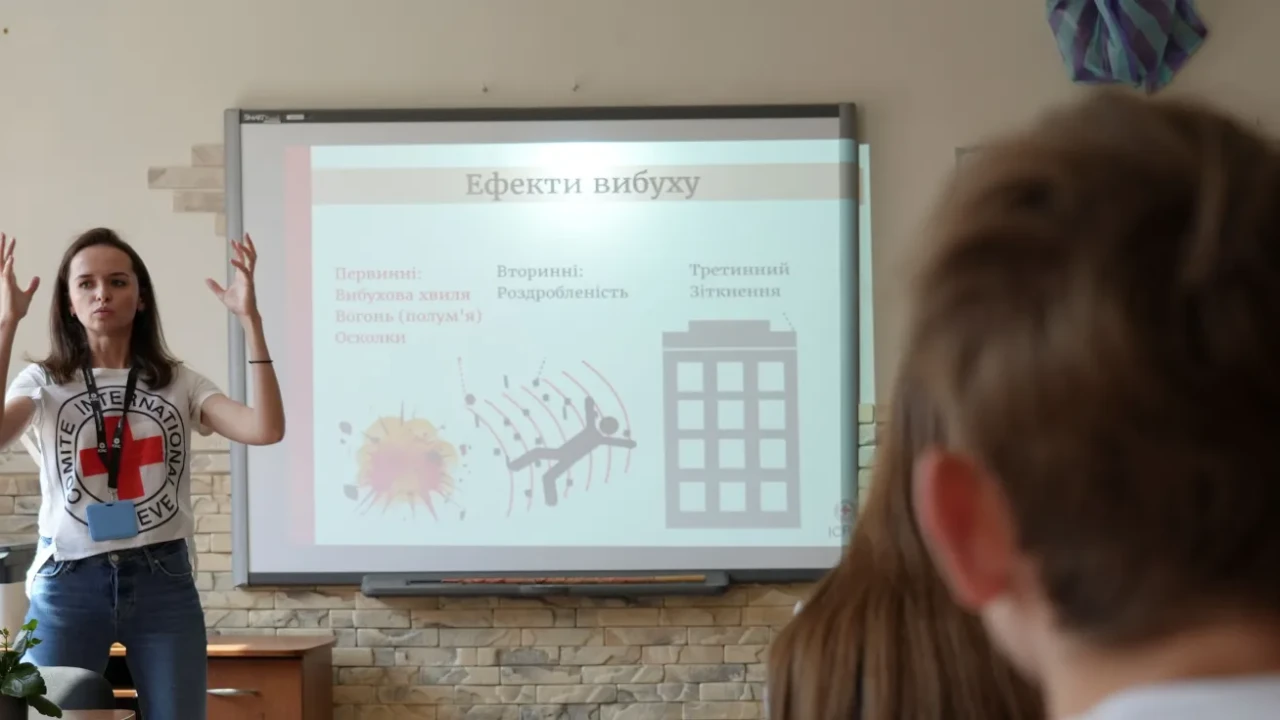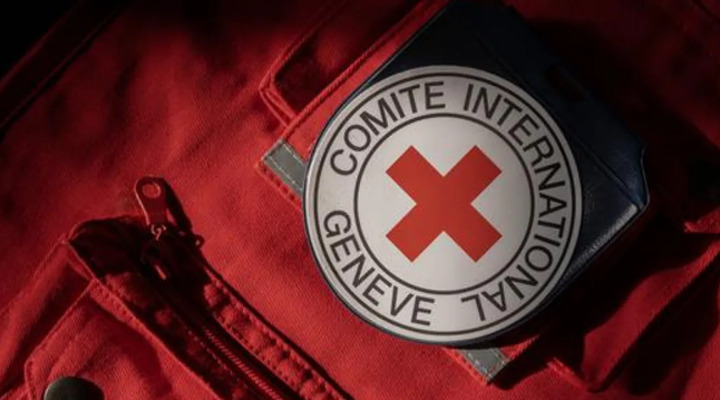Libya: Conflict weakens farmers’ abilities to mitigate climate risks

This is a modal window.
Tripoli (ICRC)— The conflict in Libya has left the country extremely vulnerable to climate variability and is likely to increase the impacts on agricultural production and therefore livelihoods, food and economic security of thousands.
In Awiniya village, southwest of Tripoli, a region where agriculture is the main source of income for a majority of the population, the raging violence forced many local farmers to abandon their land and homes to seek safety in other areas. After years of displacement, some of the farmers returned to the area to find their lands had parched while vital infrastructure was damaged due to the conflict.
“I can do nothing, I lost everything and had to start again from zero. I started planting trees again as if I was in my first year of farming, but with three consecutive years of drought, the trees didn`t grew and blossom due to the severe weather,” said Ali, a returnee farmer from Awiniya.
The difficult terrain of this mountain village makes it nonviable for farmers to dig wells, while the only water tank farmers used for emergencies in dry seasons was destroyed during the fierce fighting Awiniya witnessed since 2011.
In a country of mostly desert, where under 2% of the land is arable, more farmers are abandoning their farms amidst a scarcity of water resources, while yields of rainfed agriculture are severely low due to droughts.
Climate change is subjecting Libya to extreme climate events like increased and more severe sand and dust storms, droughts and increased temperatures. Given the impact of years of renewed conflicts, the country’s capacity to adapt has become weaker as needed resources to mitigate climate risks are being shifted to deal with short and long-term consequences of the protracted conflict.
Libya witnessed a significant decrease in rainfall between October 2020 and October 2021. The few rainy days over that period only resulted into water ponds that quickly evaporate without penetrating the soil. The irregular intensity of rainfall often causes occasional flooding that highly damages the soil, impacts agricultural production and causes economic loss. These damages are multiplied in some areas where drainage infrastructure is already damaged due to the conflict.
“With the scarcity of rainfall, I can`t afford water trucking to irrigate my orchard throughout the year, maybe in summer yes, if the rainy season had been better, but not for the whole year,” added Ali.
Like all conflict-affected countries, Libya is disproportionately impacted by climate change and is classified among the countries less prepared for climate hazards globally. Conflict has left the country vulnerable to climate variability because of low adaptive capacity which is likely to increase the impacts of natural hazards on agricultural production. The limited renewable water resources, coupled with drought and poor soil, severely limit production, forcing the country to import about 75% of the food required to meet local needs, according to the World Bank.
The repercussions are already being felt in the local markets. “More resources should be invested urgently in arable lands to mitigate the impact. We can see the shock in olive oil prices, for instance, that tripled over the last two years due to reduced production impacted by decrease in rainfall,’, said Dr. Jalal Al-Qadi, from Misrata Agriculture Research Center. “
Download this footage from ICRC Video Newsroom
For further information please contact:
Natalie NABIL BEKDACHE, ICRC Libya spokesperson, +216 5516 6657, nnabilbekdache@icrc.org
Imene TRABELSI, ICRC Near and Middle East spokesperson, +9613138353, itrabelsi@icrc.org
Follow the ICRC on facebook.com/icrc and twitter.com/icrc
Notes for editors:
ICRC work to improve food production in Libya:
The ICRC is working with Misrata Agriculture Research Center and Faculty of Agriculture in Misrata University to enable vulnerable rural communities affected by conflict or hosting displaced people in Misrata to improve their food production to a level that provides a stable economic security environment and sustainable livelihood opportunities in the long term.
The ICRC support includes helping farmers to have access to efficient agricultural services (soil analysis, soil fertility monitoring, cropping technical support) as well as allowing the training of engineers in soil analysis and soil fertility advice.
ICRC IN Libya: Facts and Figures
ICRC has been helping people affected by the conflict in Libya since 2011. In 2021, more than one million people in Libya benefited from one or more ICRC services whether directly through provision of food, essential household items and cash, or through ICRC’s support to water and healthcare services.
LOGLIST
|
ICRC Reference
|
20220321-Libya-ClimateConflict
|
|
On-screen credit |
ICRC
|
|
Shooting date
|
Awiniya 01 February 2022/Misrata 13 February 2022
|
|
Country/Location
|
Libya/Mount Nafousa (West Mountain)/ Awiniya Libya/Misrata |
|
Language
|
Arabic |
|
Producer |
Qusai Alazroni and Hussein Elyaser / ICRC |
|
Cameraperson
|
Mohaned Krema/ Hussein Elyaser ICRC |
|
Copyright / Details of restriction if applicable |
Free to use |
|
Comments / brief overview of content |
Climate risks impact agriculture in Libya while conflict has debilitated the country’s ability to mitigate these risks |
|
TIME CODE |
LOCATION / IMAGE / TIMECODED TRANSCRIPT OF SOUNDBITES |
|
|
Awiniya, Mount Nafousa, south-west Tripoli, 01/02/2022. Courtesy: ICRC |
|
00:00 – 00:20 |
Variety of wide shots show the landscape and farms in Awiniya |
|
00:21 – 00:30 |
Wide shot shows the dry and dead trees in Ali Ebrahim Al-Taleb`s farm in Awiniya |
|
00:31 – 00:46 |
A destroyed tower water tank in Awiniya |
|
00:47 – 00:52 |
A destroyed farmhouse in Awiniya |
|
00:53 – 01:08 |
Wide shot shows the dry and dead trees in Ali Ebrahim Al-Taleb`s farm in Awiniya |
|
01:09 – 01:29 |
Driving around Awiniya, the the effects of sand and dust storms due to desertification are clearly visible. |
|
01:30 – 01:44 |
Farmer Ali Ebrahim Al-Taleb walk through his farm in Awinyia. |
|
01:45 – 01:52 |
With the scarcity of rainfalls and the destruction of the only water tank farmers used to depend on for irrigation, they are forced to resort to trucking water for irrigation, an expensive option that most of them can`t afford. |
|
01:53 – 02:02 |
Wide shot show farms in Awiniya. |
|
02:03 - 05:32 |
SOUNDBITE (Arabic) Ali Ebrahim Al-Taleb Farmer in Awinyia
02:03 – 02:14 The area was badly harmed during the years of displacement from 2011 to 2017.
02:15 – 02:41 When I returned from displacement, all the trees were dead and dry, except for some olive trees, only about 10% of them survived. All the other trees, including the almonds and even the scrubs, were gone, there is nothing left of them. I started planting trees all over again.
02:42 – 03:04 I started planting trees again, from scratch, as if I were in my first year of farming. But the harsh weather did not help at all, the past three years have been drought years, and I had to water the trees by my own efforts, something I couldn't afford, so the trees didn't grow and didn't bloom.
03:05 – 03:23 In addition, during the seven years of displacement, no one was looking after the trees. Farms need someone to look after them, tilling the soil, cultivate and irrigate the trees. But these farms literally finished as a result of being abandoned for years.
03:24 – 03:54 I was 50 years old when I returned after seven years of displacement, but I had to start all over again as if I was born that day. Restoring the house from scratch, the farm, all my life as if I had nothing from before, like a 15-years-old kid who is about to start something. All my savings were gone during these years, I lost everything. I returned to start everything from zero, like a bird building its nest.
03:57 – 04:32 I can`t buy water for my farm and house together, it`s too expensive. With the scarcity of rainfall, I can`t afford water trucking to irrigate my orchard throughout the year, maybe in summer yes, if the rainy season had been better, but not for the whole year.
04:33 – 04:53 I am 53 years old now. I have not experienced three consecutive years of drought in my life. If drought came in one of the seasons, I could ward off its effects by my own efforts, but I can`t deal with the consequences of three consecutive years of drought by my own means.
04:54 – 05:13 I used to have livestock, but after these harsh years, I was forced to quit raising animals. I can`t afford feed and water the cattle since pastures were parched due to desertification and drought. I was forced to quit.
05:14 – 05:32 Agriculture was a major source of income for many people here. The wheat and barley crop, in addition to fruits and almonds, were a major source of income for farmers here. But the drought wiped this source of livelihood, and desertification had a great impact on people's income. |
|
TIME CODE |
LOCATION / IMAGE / TIMECODED TRANSCRIPT OF SOUNDBITES |
|
|
Agriculture Research Centre, Misrata, Libya, 14/02/2022 Courtesy: ICRC |
|
05:33 – 05:37 |
General shot for an entrance where a sign reads Agriculture Research Centre, Misrata. |
|
05:38 – 05:53 |
Varity of shots show agronomist Jalal Al-Qadi in a tour explaining the work of Misrata Agriculture Research Centre |
|
05:54 – 06:03 |
Wide shot shows the olive orchard in the vicinity of Misrata Agriculture Research Centre |
|
06:04 – 06:18 |
Medium and close shots show drought-withered olive tree in the vicinity of Misrata Agriculture Research Centre |
|
06:19 – 06:28 |
Wide shot shows the landscape of the farmland in Misrata Agriculture Research Centre |
|
06:29 - 09:12 |
SOUNDBITE (Arabic) Dr. Jalal Al-Qadi Head of Laboratory in Misrata Agriculture Research Centre.
06:29 – 07:10 Olive oil production has been hit hard. We noticed in the markets that the price of one liter of olive oil, which used to range between eight and ten dinars, has reached forty dinars today. This is the result of the significant decrease in production due to climate changes that caused disruptions in last season. There was no rain between October 2020 and October 2021.
07:11 – 07:38 Even the few intense rainy days throughout that period were not enough or good at all for farming, when for example it sometimes rains 60 mm in three days, in a time when plants do not need this rainwater or it is more than the penetration capacity of the soil. This leaves water ponds that quickly evaporate without penetrating. That what causes the disruptions to the production process.
07:39 – 08:05 It is also known that each plant has a certain flowering period that requires suitable temperatures and humidity. If the appropriate temperatures and humidity are not available during the flowering period, the fertilization process will fail, and thus no fruits will be produced.
08:06 – 08:32 The average annual precipitation in our region here is 250 mm. The problem is that this amount sometimes falls, but 90 mm of it falls, for example, in one day, while the rest falls in small quantities, distributed over separate days, five mm or even two mm sometimes, and this small amount does not penetrate into the layers of the earth
08:33 – 09:12 Climate change requires great preparation from everyone. Emphasis must be placed on raising people's awareness of how dangerous this issue is on the globe, especially in our country. Serious steps must be taken to stop the encroachments on agricultural lands and try to increase investment in arable lands. All our resources in this regard must be invested, and farmers' awareness of the importance of increasing production in a sustainable manner must be increased. |


